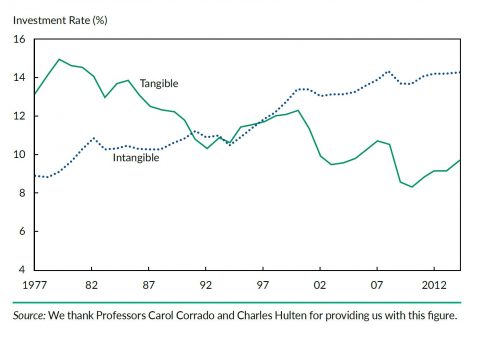by The Knowledge Leaders Capital Team, Knowledge Leaders Capital
Our long-time readers are familiar with the work of Professor Baruch Lev of the NYU Stern School of Business, whose research forms the basis for the Knowledge Leaders investment strategy. In his decades-long study of financial records, Lev first discovered a link between a firm’s knowledge capital and its subsequent stock performance, ultimately identifying a market inefficiency that leads highly innovative companies to deliver excess returns. We call this market anomaly the Knowledge Effect.
In a new article in Financial Analysts Journal, Lev and co-author Feng Gu continue to advance the findings on intangibles. The article, “Time to Change Your Investment Model,” identifies that earnings prediction has lost “much of its relevance in recent years.” As a form of predicting corporate results, “earnings no longer reliably reflect changes in corporate value and are thus an inadequate driver of investment analysis.”
The basis for this shift, the authors explain, occurred after the emergence of the semiconductor. “Starting in the early 1980s, investment in traditional, tangible assets (structures, factories, machinery, inventory) – considered assets by accountants and reported accordingly on the balance sheet – dropped precipitously from 15% of gross added value in 1977 to 9% in 2014, a 40% drop. In contrast, the investment rate in intangible capital (R&D, patents, information systems, brands, media content, business processes) – mostly expensed in corporate income statements – increased continuously from 9% to 14% of added value, a 56% increase. This radical business model transformation came to be known as the knowledge – or information revolution, an irreversible trend in developed economies.”
As a result, for companies, “the only way to survive and prosper in such a competitive environment (is) through constant product and process innovation, achieved primarily by investing in intangible assets.” Therefore, “earnings’ usefulness to investors declines sharply for companies that increasingly rely on intangible value-creating assets.” For these reasons, “GAAP-based reported earnings no longer reflect the periodic value changes (growth) of most business enterprises, and thus conventional earnings-based security analysis has lost much of its usefulness for investors in recent years.”
In summary, the authors observe: “The disappointing returns on managed funds in recent years should raise doubts about the continued usefulness of conventional security analysis. Our extensive empirical evidence on the loss of relevance of GAAP numbers, in both this article and our recent book, confirms these doubts. Certain major investors have already departed from the status quo. … We propose a different course: Rather than replace analysts with robots, substitute an improved investment methodology for an outdated one.”
If you’re interested in reading Lev and Gu’s article, download it here. Stay tuned for more on Professor Lev’s research in early 2018 and an in-depth Q&A on his latest research on intangible capital.
All quotes within are pulled from the article “Time to Change Your Investment Model,” by Feng Gu and Baruch Lev, Financial Analysts Journal, Q4 2017, a publication of the CFA Institute. Chart credit: the featured chart is pulled from the same article.
Copyright © Knowledge Leaders Capital















